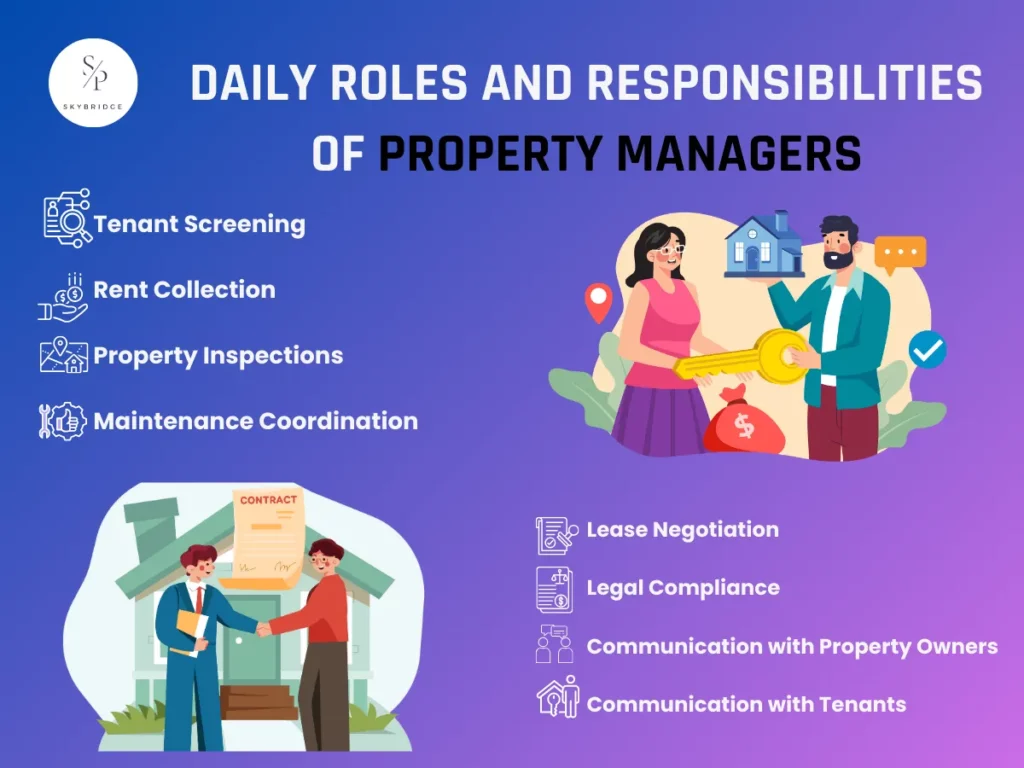Becoming a property manager in California involves important steps that ensure legal compliance, professional competence, and effective property oversight. This process includes meeting eligibility requirements such as age, education, and residency; completing state-approved pre-licensing coursework; obtaining a real estate license from the California Department of Real Estate (DRE); and affiliating with a licensed broker. Many property managers also pursue professional certifications to increase their expertise and credibility. Understanding this pathway helps aspiring managers navigate licensing laws and develop skills to manage residential or commercial properties responsibly. The following sections detail each step, providing clear guidance on how to start and succeed as a licensed property manager in California.
6 Steps to Become a Licensed Property Manager in California
Becoming a licensed property manager in California involves meeting several state-mandated eligibility criteria and completing a structured licensing process. This ensures that individuals entering the profession are legally qualified, professionally trained, and capable of managing properties with accountability. The following steps detail both the qualification requirements and the licensing sequence you must follow.
1. Meet the Minimum Age Requirement
Applicants must be at least 18 years old to apply for a real estate license in California. This age requirement is established under California Business and Professions Code Section 10150 and confirms legal capacity to enter contracts and assume fiduciary responsibilities.
2. Confirm Legal Residency or Citizenship Status
Candidates must be either United States citizens or lawfully admitted residents. A valid Social Security Number or Individual Taxpayer Identification Number is required during the application process. The California Department of Real Estate (DRE) accepts both citizens and qualified residents without discrimination.
3. Complete State-Approved Real Estate Education
To qualify for the California real estate licensing exam, applicants must complete 135 hours of pre-license coursework through a DRE-approved education provider. The required curriculum includes:
- Real Estate Principles (45 hours)
- Real Estate Practice (45 hours)
- One elective course such as Property Management (45 hours)
This coursework provides a foundation in property law, leasing practices, ethics, and trust fund management.
4. Apply and Pass the California Real Estate Exam
Once education is completed, candidates must schedule and pass the California real estate exam. The test includes multiple-choice questions covering legal responsibilities, ethics, and operational duties. A passing score of 70 percent is required to move forward.
5. Affiliate with a Licensed Real Estate Broker
After passing the exam, your license is considered inactive until you secure sponsorship from a California-licensed real estate broker. Broker affiliation is required by the DRE to activate your license and legally perform property management duties such as leasing, rent collection, and handling trust funds. The sponsoring broker submits the necessary documents to the DRE to complete license activation.
6. Optional Certifications for Career Advancement
Although not required by law, many property managers choose to pursue professional certifications such as:
- Property Management Certification (PMC)
- Certified Apartment Manager (CAM)
- Certified Property Manager (CPM)
- Master Property Manager (MPM)
Licensing Requirements for Property Managers in California
Licensed Managers
- Real Estate License
- Trust Fund Handling
- Lease Negotiation
- DRE Compliance
Full Legal Authority
- Rent Collection
- Contract Execution
- Owner Representation
- Regulatory Oversight
Unlicensed Managers
- No Real Estate License
- Limited Admin Support
- Cannot Collect Rent
- No Lease Authority
Restricted Access
- No Fund Handling
- No Legal Power
- Clerical Duties Only
- Exempt Only On-Site
Property managers in California must meet specific licensing requirements to operate legally. Primarily, obtaining a real estate license from the California Department of Real Estate (DRE) is necessary. This license authorizes managers to perform activities such as leasing, rent collection, and contract negotiation. Legal compliance ensures property managers adhere to state laws, protecting both owners and tenants. Unlicensed property managers face strict regulations limiting their permitted activities, with penalties for violations. However, certain on-site property managers may be exempt from licensing if they meet specific criteria related to property ownership and duties. Understanding these requirements is essential to operate within the law and maintain professional standards.
Real Estate License for Property Managers
Property managers must obtain a real estate license, typically a salesperson or broker license, issued by the California DRE. This license allows legally binding activities such as negotiating leases, collecting rents, and managing trust funds. Applicants undergo a registration process involving pre-licensing education, passing a state exam, and affiliating with a licensed broker. Holding this license ensures managers comply with California laws regulating property management activities.
Unlicensed Property Managers Explained
An unlicensed property manager is someone who performs property management tasks without a valid California real estate license. Under California law, unlicensed managers handle limited activities such as routine maintenance coordination or tenant communication but cannot engage in leasing, rent collection, or contract execution. Operating without a license exposes individuals to legal risks including fines and penalties.
Limitations of Unlicensed Property Managers
Unlicensed property managers cannot negotiate lease terms, collect rent, or sign contracts on behalf of owners. They are restricted from handling trust funds or representing owners in legal matters. These limitations ensure that only licensed professionals undertake critical property management functions, safeguarding owner interests and tenant rights under California law.
Exceptions for On-Site Property Managers
On-site property managers may be exempt from licensing requirements if they manage properties owned by their employer and do not engage in activities requiring a license. Typically, this exemption applies to managers overseeing a single property or complex without authority to negotiate leases or collect rents independently. California regulations specify conditions for this exemption to ensure compliance and protect stakeholders.
Key Skills and Qualifications Needed
Successful property managers must possess a range of practical skills and qualifications to manage properties effectively and meet owner expectations. Essential skills include strong communication to interact with tenants and owners, basic accounting to manage finances, organizational abilities for handling multiple tasks, legal knowledge to ensure compliance, conflict resolution expertise to mediate disputes, customer service to maintain tenant satisfaction, and investment expertise to optimize property values. These competencies support daily management and contribute to a property manager’s overall effectiveness and professionalism.
Communication
Property managers require strong communication skills to maintain clear and effective interactions with tenants, property owners, and vendors. This includes verbal and written communication, active listening, and the ability to convey information clearly to resolve issues and foster positive relationships.
Basic Accounting
Basic accounting skills are necessary for managing budgets, tracking income and expenses, and collecting rent. Property managers use these skills to ensure accurate financial records and generate reports that inform owners about property performance.
Organizational Skills
Strong organizational skills help property managers juggle multiple properties, deadlines, and documentation requirements. Effective task management, scheduling, and record-keeping enable smooth operations and timely completion of responsibilities.
Legal Knowledge
Property managers must understand landlord-tenant laws, fair housing regulations, and eviction processes. This legal knowledge ensures compliance with regulations, protects owner interests, and helps avoid costly legal disputes.
Conflict Resolution
Conflict resolution skills enable property managers to mediate tenant disputes, negotiate lease terms, and address complaints professionally. These skills support maintaining a peaceful community and protecting owner rights.
Customer Service
Excelling in customer service allows property managers to maintain tenant satisfaction through responsiveness, professionalism, and timely issue resolution. Positive tenant relationships contribute to higher retention rates and property reputation.
Investment Expertise
Investment expertise assists property managers in analyzing market trends, evaluating returns on investment, and optimizing property values. This knowledge helps owners maximize their financial outcomes through informed management decisions.
Is Property Management a Good Career?
Quick Career Facts
- Avg. Salary in California: $84,990 (BLS 2023)
- Job Growth: Rising steadily with high rental demand
- Active Rentals in CA: 78,069+ (Zillow, May 2025)
- Legal Insight: Expertise in AB 1482 is increasingly valuable
Why It’s a Good Career
- High housing market activity
- Stable income + job variety
- Flexible work opportunities (residential, commercial, remote)
- Important legal + financial role
Property management is a strong career choice in California due to high rental demand, legal complexity, and steady income potential. Zillow reports 78,069 active rental listings statewide, while Indeed lists the average property manager salary at $78,207 annually. With increasing need for compliance under laws like AB 1482, property managers play a vital role in maintaining property operations and tenant relations. The profession offers long-term stability, diverse opportunities, and room for growth within the real estate industry.
How Much Do Property Managers Earn in California?
As of May 2023, property managers in California earn an average annual salary of $84,990, equating to approximately $40.86 per hour, according to the U.S. Bureau of Labor Statistics (BLS).
Regional Salary Variations
Salaries for property managers vary across California’s metropolitan areas:
| City | Average Annual Salary | Average Hourly Wage |
| San Francisco-Oakland-Hayward | $99,000 | $47.59 |
| Los Angeles-Long Beach-Anaheim | $82,090 | $39.47 |
| Sacramento–Roseville–Arden-Arcade | $80,090 | $38.51 |
| San Diego-Carlsbad | $77,693 | $37.35 |
These variations are influenced by factors such as local cost of living, demand for rental properties, and the complexity of property portfolios managed.
How Many Rental Properties Are Available in California?
As of May 2025, according to Zillow Rental Market Trends, California has approximately 78,069 active rental listings. The state continues to experience strong demand for rental housing, driven by population density and limited availability in major metropolitan areas. With an average monthly rent of $2,775, which is significantly higher than the national average, California’s rental market remains highly competitive, especially in cities such as Los Angeles, San Diego, and San Francisco.
How Do Rent Control Laws in California Affect Property Managers?
Under AB 1482 (Tenant Protection Act of 2019), California imposes statewide rent control that impacts how property managers operate.
Key Rules:
- Rent Increase Cap: Max 5% plus local inflation, not to exceed 10% per year
- Just Cause Eviction: Termination of tenancy requires legal justification
Impacts on Property Managers:
- Must track inflation rates and enforce legal rent limits
- Require documented communication for lease enforcement and tenant relations
- Must stay compliant with evolving regulations
Property managers need strong legal knowledge and administrative accuracy to comply with rent control mandates.
Daily Roles and Responsibilities of Property Managers

Property managers handle a range of tasks that ensure smooth operations across rental properties. Their daily work includes tenant communication, maintenance oversight, lease management, and legal compliance. Among these, property manager responsibilities such as rent collection, inspections, and vendor coordination play a critical role in maintaining property value and tenant satisfaction.
- Tenant Screening: Evaluates applications, backgrounds, and credit to place reliable tenants.
- Rent Collection: Manages payments, addresses delinquencies, and ensures consistent cash flow.
- Property Inspections: Conducts regular assessments to monitor condition and lease adherence.
- Maintenance Coordination: Schedules repairs, manages vendors, and oversees upkeep
- Lease Negotiation: Updates terms, processes renewals, and ensures legal alignment.
- Legal Compliance: Follows state and federal housing laws and licensing rules.
- Owner Communication: Shares reports, budgets, and performance updates.
- Tenant Communication: Resolves issues, explains policies, and supports retention.
Benefits of Hiring a Property Manager
Working with a professional property manager provides both operational relief and financial efficiency for rental property owners. Among the most valuable benefits of hiring a property manager are time savings, reduced stress, improved legal compliance, and structured financial oversight. This support allows owners to focus on investment strategy while day-to-day property challenges are handled with consistency and expertise.
- Saves Time: Managers take over tasks like rent collection, maintenance coordination, and tenant communication.
- Reduces Stress: They manage emergencies, tenant disputes, and service vendors, giving owners peace of mind.
- Ensures Legal Compliance: Managers stay informed on landlord-tenant laws, fair housing rules, and eviction procedures.
Improves Financial Management: Through rent tracking, budgeting, and reporting, they help maintain stable income and transparent records.
Tips for Hiring the Right Property Manager
Selecting the right professional is key to protecting rental assets and ensuring smooth operations. When hiring a property manager, owners should focus on proven experience, transparent fee structures, communication quality, and clearly defined service terms. A careful vetting process helps avoid mismanagement and builds a reliable partnership.
- Verify Experience and Credentials: Look for certifications and affiliations with industry bodies like IREM or CACM.
- Check References and Reviews: Speak with past clients and review feedback on responsiveness and issue resolution.
- Understand Fee Structures: Clarify whether the manager charges a flat fee or a percentage of rent, and review all terms for transparency.
- Evaluate Communication: Test responsiveness during initial outreach and confirm preferred contact methods.
- Review Contracts Carefully: Ensure all services, fees, and cancellation terms are clearly outlined and aligned with expectations.
If you are looking for a professional property manager in California, partnering with a firm that understands the local market is essential. Skybridge Property Group offers regional expertise across Los Angeles, Diamond Bar, Pomona, La Puente, and San Dimas, making them a valuable asset for tailored property management solutions.







